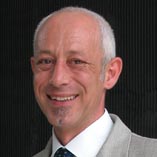Pier Paolo Mariotti, CMP, CMM is a Meeting Manager for EURAC convention center in Bolzano – the host city of the 23rd ECM Summer School.
\n
Born in the heart of the Alps, he graduated in Economics and Business Administration at the Università degli Studi di Verona. He worked as photojournalist and travelled extensively in South East Asia for several European and Asian publishers. In 1994 he came back to Italy with his family, worked for the South Tyrol Convention Bureau and also set up the Torino Convention Bureau in 1999. Pier Paolo Mariotti is Founder and Director of “.IT Meetings and Incentives in Italy” and since 2003, has been a Meeting Manager at the European Academy of Bolzano and the Managing Director of the EURAC and TIS Convention Centers.
\n
Pier Paolo Mariotti is a man convinced of the necessity of green events for the future development of the tourism and meetings industry. In his presentation at the ECM Summer School he introduced the city of Bolzano and the EURAC convention center and revealed a few facts about sustainability and the environmentally-friendly approach.
\n
\n
\n
How did a photographer become a Meeting Manager at a conventions venue?
\n
\n
It is always a matter of communication! I had a passion for photos but never did it professionally until the day I showed them to some the people who worked for a magazine. And then I started to take photos for the magazines at the same time as writing the articles. As I worked mostly for travel magazines, I was already connected with tourism. When I came back from Asia, I was offered a job setting up a CVB simply because I had travelled a lot and therefore I was supposed to know what travellers are looking for… and so we set up the first CVB in Italy – South Tyrol Convention Bureau.
\n
Since then CVBs have always been a part of my life. I was asked to set up the Torino CVB and we also founded “.IT Meetings and Incentives in Italy” because there was a serious lack of CVBs in Italy.
\n
\n
\n
Where did the idea of environmentally-friendly events come from?
\n
\n
The trigger was when I went to EMEC in Copenhagen in 2007. Afterwards we decided that we were heading in this direction and we took the opportunity offered by the unique selling point of our geographical situation. But I think that I should say as well that the whole “green” approach is very much in our DNA. We have a relatively small place right in between the mountains so our resources are limited and we know it. People living in this kind of location have always been affected by the question of sustainability; they know they must preserve the area.
\n
\n
\n
Would you say that focusing on green events was a logical step for you?
\n
\n
Absolutely, green meetings are only possible in areas that are favourable to them. It is already much more complicated in huge cities and in some circumstances it is simply impossible. But once you have the right location, it is only a matter of focusing and you realise that you can do a lot of things.
\n
\n
\n
What is your vision of environmentally-friendly developments in the future?
\n
\n
Green public procurement. One day it will become a necessity and sustainable practices will be required by governments. There will be a vast expansion of the green movement and if you are not ready for that, you will miss the boat. Just take the word “crisis”. It comes from the Greek “krinomai” which means to judge, to take a decision and therefore to look for new solutions to a situation that has changed. And this is how I perceive our current situation which is forcing us to look for new solutions. And we have to do this because maybe our generation is lucky, we are at the peak of the possibilities. And even my daughter will probably be lucky but the daughter of my daughter will have a problem because one thing is sure: the world’s resources will run out. So sustainable energy is the only possible way of resolving the situation.
\n
\n
\n
What advice would you give to those who would like to live and work in a “green” way?
\n
\n
Be good to yourself and to others. Sometimes you just need to change your habits a little bit, think in a green way. Why have a big diesel car when actually I only need a small LPG car? Whenever it is possible, I try to take the train to avoid flying… Once you have this approach it is easy to apply it to everything, the most difficult part is changing your habits.
\n
\n
\n
